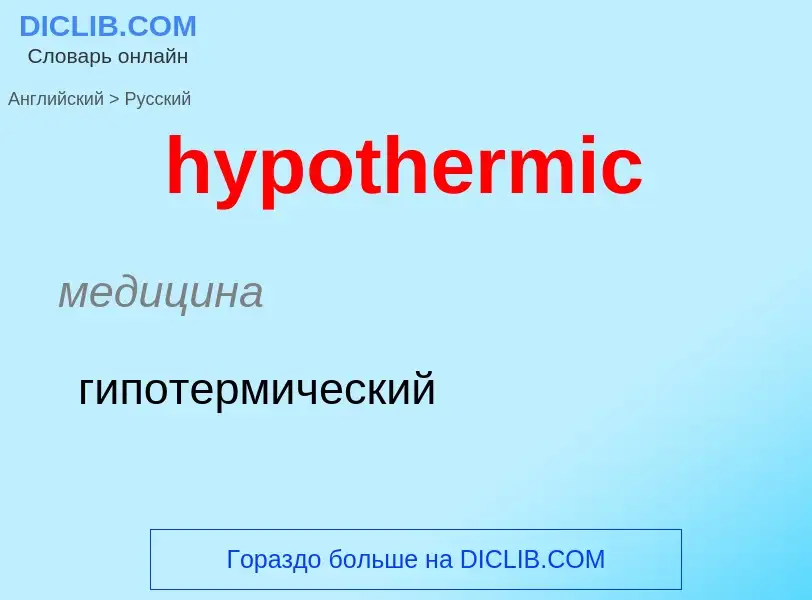Μετάφραση και ανάλυση λέξεων από την τεχνητή νοημοσύνη ChatGPT
Σε αυτήν τη σελίδα μπορείτε να λάβετε μια λεπτομερή ανάλυση μιας λέξης ή μιας φράσης, η οποία δημιουργήθηκε χρησιμοποιώντας το ChatGPT, την καλύτερη τεχνολογία τεχνητής νοημοσύνης μέχρι σήμερα:
- πώς χρησιμοποιείται η λέξη
- συχνότητα χρήσης
- χρησιμοποιείται πιο συχνά στον προφορικό ή γραπτό λόγο
- επιλογές μετάφρασης λέξεων
- παραδείγματα χρήσης (πολλές φράσεις με μετάφραση)
- ετυμολογία
hypothermic - translation to ρωσικά
медицина
гипотермический
[haipəu'θə:miə]
общая лексика
гипотермия
медицина
общее охлаждение организма (гипотермия)
существительное
общая лексика
переохлаждение (организма)
медицина
гипотермия
Ορισμός
Βικιπαίδεια

Hypothermia is defined as a body core temperature below 35.0 °C (95.0 °F) in humans. Symptoms depend on the temperature. In mild hypothermia, there is shivering and mental confusion. In moderate hypothermia, shivering stops and confusion increases. In severe hypothermia, there may be hallucinations and paradoxical undressing, in which a person removes their clothing, as well as an increased risk of the heart stopping.
Hypothermia has two main types of causes. It classically occurs from exposure to cold weather and cold water immersion. It may also occur from any condition that decreases heat production or increases heat loss. Commonly, this includes alcohol intoxication but may also include low blood sugar, anorexia and advanced age. Body temperature is usually maintained near a constant level of 36.5–37.5 °C (97.7–99.5 °F) through thermoregulation. Efforts to increase body temperature involve shivering, increased voluntary activity, and putting on warmer clothing. Hypothermia may be diagnosed based on either a person's symptoms in the presence of risk factors or by measuring a person's core temperature.
The treatment of mild hypothermia involves warm drinks, warm clothing, and voluntary physical activity. In those with moderate hypothermia, heating blankets and warmed intravenous fluids are recommended. People with moderate or severe hypothermia should be moved gently. In severe hypothermia, extracorporeal membrane oxygenation (ECMO) or cardiopulmonary bypass may be useful. In those without a pulse, cardiopulmonary resuscitation (CPR) is indicated along with the above measures. Rewarming is typically continued until a person's temperature is greater than 32 °C (90 °F). If there is no improvement at this point or the blood potassium level is greater than 12 mmol/liter at any time, resuscitation may be discontinued.
Hypothermia is the cause of at least 1,500 deaths a year in the United States. It is more common in older people and males. One of the lowest documented body temperatures from which someone with accidental hypothermia has survived is 12.7 °C (54.9 °F) in a 2-year-old boy from Poland named Adam. Survival after more than six hours of CPR has been described. In individuals for whom ECMO or bypass is used, survival is around 50%. Deaths due to hypothermia have played an important role in many wars.
The term is from Greek ῠ̔πο (ypo), meaning "under", and θέρμη (thérmē), meaning "heat". The opposite of hypothermia is hyperthermia, an increased body temperature due to failed thermoregulation.


![''[[Snow-storm: Hannibal and His Army Crossing the Alps]]'', [[J. M. W. Turner]] ''[[Snow-storm: Hannibal and His Army Crossing the Alps]]'', [[J. M. W. Turner]]](https://commons.wikimedia.org/wiki/Special:FilePath/Joseph Mallord William Turner 081.jpg?width=200)
